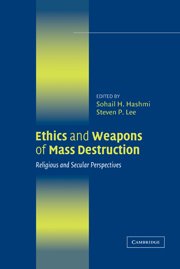Book contents
- Frontmatter
- Contents
- Tables and Figures
- Acknowledgments
- Abbreviations
- Ethics and Weapons of Mass Destruction
- Introduction
- 1 Weapons of Mass Destruction: A Brief Overview
- 2 The International Law Concerning Weapons of Mass Destruction
- PART ONE THE ORIGINAL DEBATE
- 3 Realist Perspectives on Ethical Norms and Weapons of Mass Destruction
- 4 Realism and Weapons of Mass Destruction: A Consequentialist Analysis
- 5 Natural Law and Weapons of Mass Destruction
- 6 War and Indeterminacy in Natural Law Thinking
- 7 Liberalism: The Impossibility of Justifying Weapons of Mass Destruction
- 8 A Liberal Perspective on Deterrence and Proliferation of Weapons of Mass Destruction
- 9 Christianity and Weapons of Mass Destruction
- 10 Christian Apocalypticism and Weapons of Mass Destruction
- PART TWO EXPANDING THE CONVERSATION
- PART THREE CRITICAL PERSPECTIVES
- Contributors
- Index
3 - Realist Perspectives on Ethical Norms and Weapons of Mass Destruction
Published online by Cambridge University Press: 05 June 2012
- Frontmatter
- Contents
- Tables and Figures
- Acknowledgments
- Abbreviations
- Ethics and Weapons of Mass Destruction
- Introduction
- 1 Weapons of Mass Destruction: A Brief Overview
- 2 The International Law Concerning Weapons of Mass Destruction
- PART ONE THE ORIGINAL DEBATE
- 3 Realist Perspectives on Ethical Norms and Weapons of Mass Destruction
- 4 Realism and Weapons of Mass Destruction: A Consequentialist Analysis
- 5 Natural Law and Weapons of Mass Destruction
- 6 War and Indeterminacy in Natural Law Thinking
- 7 Liberalism: The Impossibility of Justifying Weapons of Mass Destruction
- 8 A Liberal Perspective on Deterrence and Proliferation of Weapons of Mass Destruction
- 9 Christianity and Weapons of Mass Destruction
- 10 Christian Apocalypticism and Weapons of Mass Destruction
- PART TWO EXPANDING THE CONVERSATION
- PART THREE CRITICAL PERSPECTIVES
- Contributors
- Index
Summary
What role do ethics play in statesmen's decisions about the acquisition and use of nuclear, chemical, and biological weapons? Most realists would write an exceedingly short paper – indeed, perhaps a one-word telegram – on this topic: “None.” Real statesmen do not follow ethical norms. Power considerations and the rules of prudence, not ethical concerns, govern international life. In the modern world, as in the ancient world, the strong do what they can and the weak do what they must.
I have considerable, but by no means complete, sympathy for this position. This chapter therefore presents an analytic description of the standard realist position, assesses current debates about its accuracy, and provides the beginnings of an alternative realist vision. I argue that some, though by no means all, statesmen do follow ethical norms in their weapons policies and that realists must take this fact into account, while not losing their focus on the highly competitive nature of international politics. In the modern world, the strong may not want to do what they can, for excessively aggressive behavior will force the weak to develop their own weapons of mass destruction. This result would be neither in the interest of the great powers, including the United States, nor, I believe, in the broader interests of the global community.
SOURCES AND PRINCIPLES
Realists trace their intellectual roots back to the classical writings of Thucydides, Hobbes, and Clausewitz, and these philosophers' views about the “necessities of war” are often mirrored in the writings of modern neorealists.
- Type
- Chapter
- Information
- Ethics and Weapons of Mass DestructionReligious and Secular Perspectives, pp. 73 - 95Publisher: Cambridge University PressPrint publication year: 2004
- 19
- Cited by



